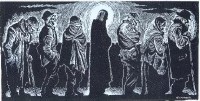

Karen House Catholic Worker
 |
Karen House Catholic Worker |
The RoundTable Intimacy and Solidarity Fall 1984 Major Articles
|
Download Entire Issue by Clicking Image Above (large file - it takes a minute!) |
|||
Karen House: 1840 Hogan St. Saint Louis, MO 63106 Contact Us: 314.621.4052 |
Regular Features
|
Why This Issue: Intimacy and solidarity. At first glance they can seem to define the opposite ends of a continuum. Intimacy brings to mind family gatherings, quiet moments with a close friend, experiences of closeness, tenderness, and warmth: very immediate, personal experiences. Solidarity calls to mind the contrary: perhaps a large march or protest rally, work on behalf of people far away or quite different from ourselves, organized opposition to government policy, large numbers of people, intellectual analysis and commitment to an ideal.
Long or deep experience with either intimacy or solidarity teaches us that one leads to another, as certainly as the river to the ocean; in fact, that each requires the other. Each experience of profound closeness to another reveals to us that we are all one in some unimaginably real way, that we are all bound to each other, that there is finally only one life, which we all share together. So intimacy teaches us the solidarity of all humanity.
Similarly, if we follow faithfully the call to solidarity with all of humanity we find that, as Thomas Merton says “It all comes down to a few re1ationships.” We find in the Catholic Worker experience that solidarity with the poor finally means finding the poor across the breakfast table from us. Or as Joan Uhlen and Rachel Pinal tell us in their letter from Nicaragua, solidarity with the victims of militarism leads as far as listening with them to the bombs falling and attending their funerals.
In the title article of this issue, Henri Nouwen explores carefully the ligaments that bind intimacy and solidarity. In the center spread a photo essay by Mev Puleo captures for us the clear sight of moments of intimate solidarity. Jackie Haessly does us the favor of surveying the same landscape from the opposite viewpoint and explores how we can celebrate the intimacies of our 1ives in a way that opens us to others rather than closing us off from them. Ellen Rehg reflects on one application of solidarity as she examines the many facets of gift-giving at Christmastime. The house articles, as ever, are their unpredictable blend of intimacy in solidarity, experiments of solidarity in intimacy. All in all, the hope is that in these varying perspectives on the relationship of intimacy to solidarity, you may find something to trigger growth in your own experiments, joyfully offered for your consideration.
-Virginia Druhe |
The RoundTable is 24 pages long. To download, you'll need the most recent version of Adobe Acrobat. Download Adobe Acrobat 8 here (it's easy AND free!)
Search all of the RoundTable issues for an author, subject or title here: |